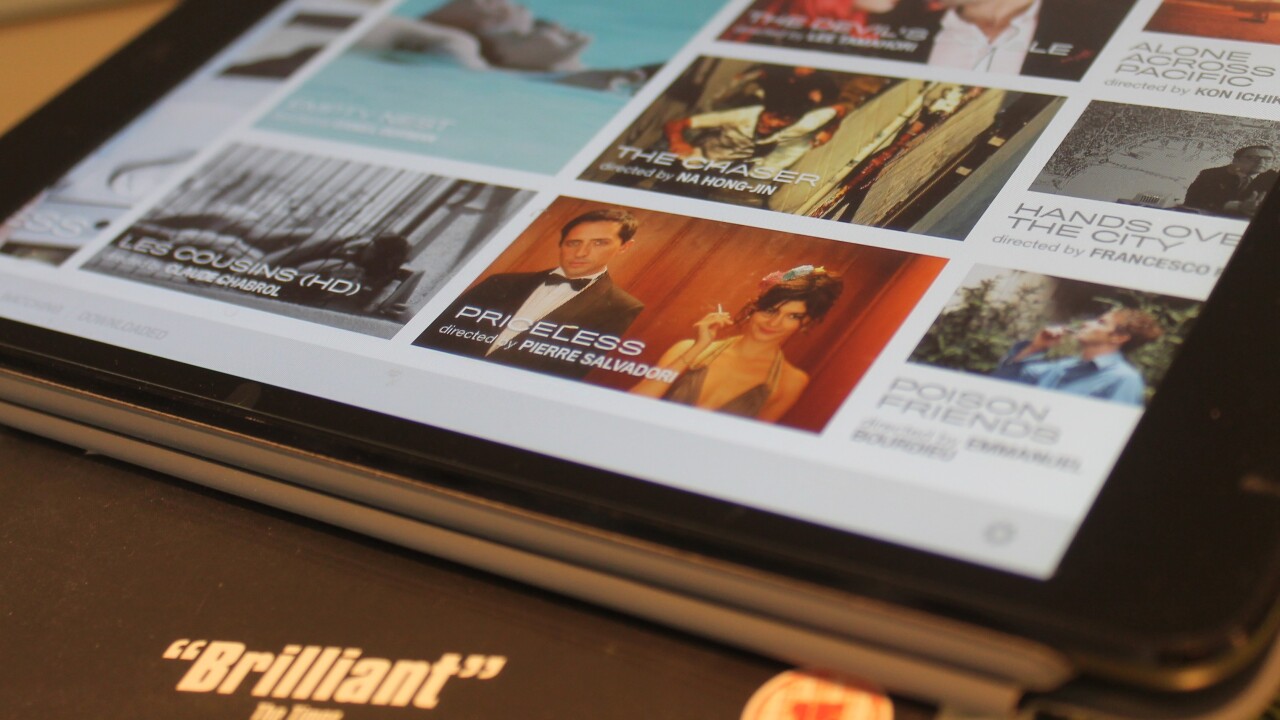
Scrolling through the usual list of on-demand video-streaming services on my PS3 last year, I couldn’t quite decide whether to fire up iPlayer to watch some documentaries, see what movies were going down on Blinkbox, or experience some random verbal enlightenment through TED’s YouTube channel.
For reasons I can’t quite explain, my eyes were eventually drawn to one of the handful of ‘other’ services I’d habitually ignored in the TV/Video Services section, which include Animax and VidZone. “What the hell is MUBI?,” I wondered.

It transpired that MUBI was a “…curated online cinema bringing you cult, classic, independent, and award-winning movies,” and was open for business in more than 200 countries.
Like linear
I was immediately drawn to the basic concept of what MUBI was all about. You see, one of the big issues many people have with content, be it on online entertainment emporiums such as Netflix or the bricks-and-mortar Blockbusters of yore, is that there is too much choice. Filtering through the cacophonous crackle of C-List flicks (that may actually be quite enjoyable), remakes, sequels, spin-offs and all the rest, can be painstaking.
I’m not for a second suggesting that the on-demand, unlimited streaming revolution is a bad thing. Far from it. But one of the key benefits of traditional broadcast ‘linear’ TV has always been that you have to watch what the broadcasters, well, broadcast. Yes, your choices are stifled, but you do end up watching stuff you’d otherwise never have seen, and – importantly – it’s devoid of hassle.
MUBI takes this key benefit, gives it a boost by way of a little more choice, and then adopts a Netflix-style approach the rest of the way.

How it works
Every day, a team of movie experts at MUBI introduce a new film into the mix, after which you have 30 days to watch it before it vanishes from sight. So in effect, MUBI only ever has 30 movies available at any one time, and previously-aired films will rarely, if ever, make a reappearance.
At the time of writing, there is actually a little quirk in the system if you watch MUBI on the PS3, as it still adheres to an old model – you actually have 69 movies to watch at any given time. This will be brought into line with the other platforms shortly though. In addition to the PlayStation, a monthly subscription gains you access to films on iOS, Android tablets, Sony Bravia TVs and the Web.
The interface and functionality varies a little depending on the platform. But using the iPad as an example, you scroll horizontally through a library of movies that contain the cover art, title, and director’s name.

Clicking on each title surfaces more details, including a plot synopsis, country of origin, language, duration, and MUBI’s own editorial ‘review’.

Titles can be downloaded temporarily for offline consumption, and beamed to your TV via AirPlay and Apple TV. The iOS or Android tablet app doesn’t support Chromecast as of yet unfortunately – but we’re told that this is coming in the future.
In terms of costs, the monthly/yearly subscription rates are $4.99/$34.99 (USD), €4.99/€34.99 (EURO), and £2.99/£22.99 (GBP). Markedly cheaper than Netflix, no doubt, but that’s reflected in the extent of the content available between the two.
That’s MUBI in a nutshell, at least. As the company prepares to launch its first native app for Android smartphones in the coming weeks, we caught up with founder Efe Cakarel to get the lowdown on where things have come from, where they’re at, and where things could go from here.

In the beginning: ‘The Auteurs’
MUBI wasn’t always known by that name. Founded by Turkish-born Cakarel in 2007, ‘The Auteurs’ was originally a Web-only affair given that, well, the tablet and smartphone revolution wasn’t yet underway.
“Making great content available on any connected device was always the vision,” explains Cakarel. “So platform integration has been a key part of our technology strategy since the start.”
Curiously, back in 2010 MUBI became one of the first video-on-demand (VoD) services to hit a games console, when it arrived for PlayStation in Europe. The joint-collaboration was a major scoop for MUBI, with the two companies teaming up to co-create the app.
“Technologically speaking, it was an exciting challenge to develop the app, there was no real precedent and any precedent that did exist, we wanted to break and bring our audience the highest fidelity experience possible,” says Cakarel. “The PS3 went live in 18 territories in Europe and Asia-Pacific; PS4 is on the way (for the MUBI app), and we will expand that to 32 territories, with a global roll-out following next year.”
MUBI has always been global too, which is not a typical trait of subscription VoD services. Netflix for example has really taken its time to unfurl its flag in international waters, but then again it is a different proposition, with a far more extensive range of content.
The name-change was introduced in 2010, for no reason other than Cakarel saw a need to use a name that “could travel and grow with us,” though he adds that it doesn’t stand for anything in particular, “apart from great cinema, of course.”
Global norming
Today, MUBI is dual-headquartered in London and San Francisco, though its core team of 50 is spread around the world, with hubs in Istanbul, Munich, Oslo, Mexico City, among other places. It has just hired a VP for Greater China too. Other key roles include development, analytics, marketing, content and design, and it employs dedicated country managers who hand-pick the best movies from their region.
“These are people with incredibly deep knowledge of cinema but they’re not the only cinephiles in the building,” says Cakarel. “What unites us all at MUBI, from the developers to the marketing team, is a passion and excitement for film.”
MUBI isn’t technically profitable yet, but Cakarel attributes this to the continuous reinvestment back into scaling the business. “We will continue to invest in our growth and don’t expect to be profitable for a long time,” he says. “I learned a lot from Jeff Bezos at Amazon. It’s all about top-line growth at our stage of development. Look at Twitter – it has a €20 billion market cap and is only just profitable.”
Cakarel remains tight-lipped about the global spread of its user-base, though they have revealed broad numbers for 2013. They had 15 million unique visitors last year, and counted more than 7 million registered users. Drilling down into the data, Cakarel says that, on average, its users watch 4.1 movies each month, though this can be more than 5 in some countries.
In terms of the origins of the movies, yes, there is a large number of subtitled international films on there, but there is a lot of English-language ones too. Around 30 percent of its titles are from the US, 30 percent from Europe, 20 percent from Asia, and 10 percent from Latin America. The rest are divided among other regions, including Africa.
While there are other similar platforms out there, such as the hitherto North America-focused Fandor, Cakarel is quick to point out that while ‘indie’ and ‘art-house’ are very much on the agenda at MUBI, you will also find some mainstream movies in there too, including big-hitters such as Inception.
“Our only real benchmark for content is that the film has something – something unforgettable,” says Cakarel. “Maybe that’s something interesting or new, something ‘cult’ or a guilty pleasure. Another factor that separates us from the pack is our huge social community and discovery features. We don’t limit our library of information to just the films you can watch, but operate a huge database of films. So for us, MUBI can be a place not only for watching, but a place to have an opinion, to discuss and discover great cinema too.”
And this is a point worth picking up on here. There are a number of niche social networks for movies elsewhere on the Web, but because MUBI is a destination for watching movies, it’s easy to forget that it also holds an arsenal of movie-centric information, glued together by a passionate army of film-fans. While you can talk about Legally Blonde to your heart’s content, you shouldn’t expect it to appear in your MUBI streaming library any time soon.

Perhaps one of the most impressive facets of the MUBI story is its international footprint.
“We’re global, the only (movie) subscription service that’s available basically everywhere,” says Cakarel. “MUBI is live in more than 200 territories, so wherever you go you’ll be able to use your subscription, which means it’s particularly good for those who travel a lot.”
While you can take your MUBI subscription with you wherever you roam, for rights-related reasons, users will see a different selection of flicks in each country.
Content & licensing
The one thing that interests me about platforms such as MUBI is rights issues, vis-à-vis how does a VoD platform with such a global reach circumvent the licensing issues for each country? There’s a reason why Netflix introduces new markets in stages, rather than all at once.
Is there a central body here who receives the money and dishes out permission slips?
“It would be a dream if there was a central body,” says Cakarel, “but the distribution system globally is incredibly fragmented. Each country is treated completely separately and is governed by its own rules and cultures. Rights are one of the most challenging – and rewarding – parts of this business.”
On a practical level, MUBI acquires films in a fairly traditional way. It attends film festivals, meets sales people, and arranges multi-title deals direct from distributors and even Hollywood studios.
In cases where they have specific titles in mind, they liaise directly with the filmmakers and relevant rights-holders. “We like to be daring and innovative, but it ultimately depends on who owns the content,” explains Cakarel. “The market attitude towards VoD has only now begun to change – until recently, the waters were very wild and untested, which made getting deals done in the early years challenging. You really had to work with visionary people.”
These days, with the likes of Netflix garnering significant mindshare, Cakarel says that there is a “lot more product understanding” across the industry. “Owners understand the real value of having their film instantly available, so the conversations are easier,” he adds.
As we’ve noted already, given rights vary from country to country, the types of films you see on MUBI vary depending on where you are in the world. Similar to how it is on the likes of Netflix. “Rights are broken up territory-by-territory, so if you wanted to show a film globally you could potentially end up having to sign hundreds of different distribution agreements.”
A veritable minefield, you’ll no doubt agree.
One notable development on Netflix in recent times has been its expansion into original content. MUBI too has dabbled in the original content realm, having produced a short film with Cannes Palme d’Or winner Apichatpong Weerasethakul called ‘Ashes’. Cakarel says they could go down this route in the future, but there are no immediate plans to revisit this.
Crystal ball
So what role exactly does MUBI fulfil in an increasingly saturated online video market? The answer is pretty clear. My view is that MUBI works because people like to be advised on what’s worth watching and what’s not. Choice is great, but too much choice can be a bad thing. Netflix is a minefield for finding things to watch, beyond the likes of Breaking Bad and House of Cards.
“I think in this age we are in, where everything is available all of the time, and on any device, we are drowning under a deluge of content and we need a guide,” says Cakarel. “So editorial, curation, selection – whatever you want to call it – is only going to become more important. That’s what MUBI does. We cut through the noise. Even though we are a tech company and my background is in computer engineering, I don’t think an algorithm should be deciding which director is better – Fellini or Spielberg.”
Having just announced compatibility with Amazon Fire for the UK, Germany and the US, a new PS3 and PS4 app in the works, its soon-to-launch Android mobile app, and Chromecast support on the horizon, the remainder of the year is looking busy for the startup.
Elsewhere, Cakarel says Asia is MUBI’s next big push. “The next few months, I’ll spend more time in Hong Kong, Beijing, Tokyo and Taipei than my home,” he says. “Beyond that, we’ll continue to roll out more platforms in more territories and will keep expanding our team.”
Within five years, Cakarel says that whenever you want to watch a movie, you’ll think of MUBI. “But we’ll still be at the beginning of our journey,” he says. “Over the coming decades and across the world, Internet TV will replace linear TV. Apps will replace channels. Remote controls will disappear, and screens will proliferate. As Internet TV grows from millions to billions, MUBI will lead the way, along with Netflix, Amazon, Google, Alibaba, Rakuten, and Xiaomi – that’s it.”
Ambitious? “Certainly.” Possible? “Everything is.”
Related read: Why it’s so hard to legally stream new movies online
➤ Mubi
Get the TNW newsletter
Get the most important tech news in your inbox each week.





